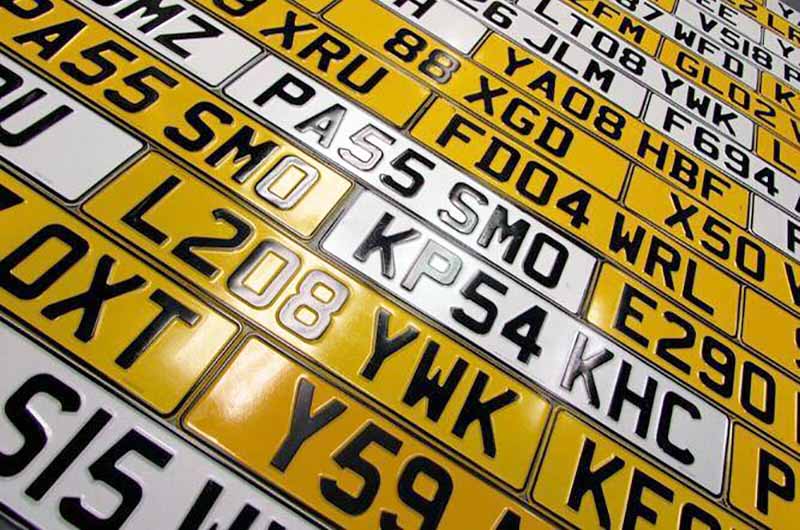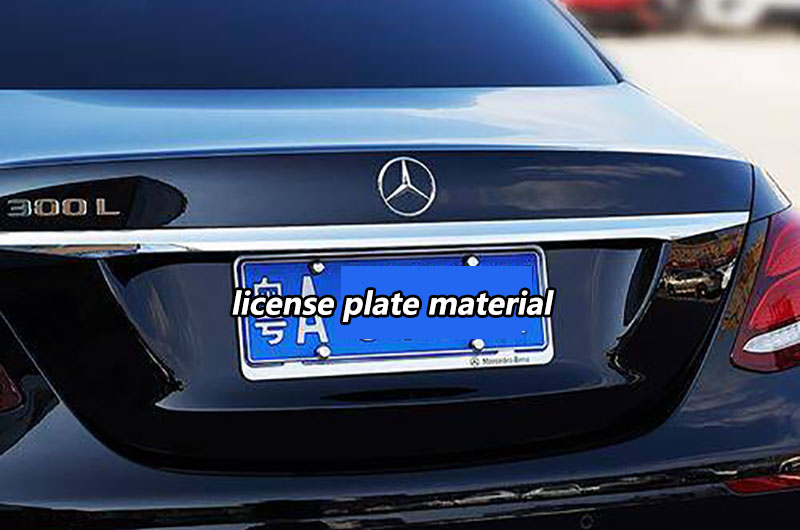With the continuous growth of automobile ownership and the continuous improvement of the market economy, various fields of the automobile industry have developed rapidly. This trend has driven the continued increase in demand for automobile license plates, especially for license plates using 1050 aluminum plates.
1050 aluminum plates are widely used in license plate manufacturing due to their fixed height and stability properties. As market demand for automobiles and related products continues to increase, so does the demand for this material.
The most important thing about using 1050 H12 aluminum plate as license plate material is its durability and corrosion resistance. Aluminum panels, especially those made from alloys like 1050 H12, have excellent service life even in harsh weather conditions. They are also lightweight, which makes them easy to handle during installation and reduces the load on the vehicle.

1. Is 1050 H12 aluminum plate durable enough for license plates?
License plates are exposed to various environmental factors such as rain, snow, and sunlight. The customer wanted the board to be able to withstand these conditions without deteriorating quickly.
2. Does 1050 H12 aluminum plate comply with regulatory standards as a license plate material?
The reflectivity and visibility meet the standards, and the specific size requirements are in accordance with customer requirements.
3. Can the 1050 H12 aluminum sheet plate for license plate material be customized?
Can it be customized according to customer's specifications such as size, shape, color or design. 1050 H12 aluminum sheets can be easily customized to meet customer requirements through processes such as printing, embossing or coating.
4. Is it cost-effective to use 1050 h12 aluminum plate as license plate material?
Prices are affordable, cost and quality are balanced, and customer satisfaction is paramount.
Reasons for choosing 1050 H12 aluminum plate as license plate material
- 1. Corrosion resistance: Aluminum, especially in alloy forms such as 1050, has excellent corrosion resistance. This is critical for license plates that are exposed to a variety of weather conditions and environmental factors.
- 2. Lightweight: Aluminum is much lighter than steel, making it an ideal choice for license plates. The reduced weight benefits fuel efficiency and overall vehicle weight.
- 3. Formability: H12 status indicates that the aluminum has been strain hardened and partially annealed. This makes it relatively soft and easy to form, which is important when stamping or embossing license plate numbers and letters.
- 4. Cost-Effectiveness: 1050 aluminum is one of the most economically priced aluminum alloys, making it a cost-effective choice for license plate production.
- 5. Reflectivity: Aluminum can be easily polished to a high gloss, which is useful for reflective license plates to help improve visibility in low-light conditions.
- 6. Recyclability: Aluminum is highly recyclable, making it an environmentally friendly choice for license plate materials.
Overall, 1050 H12 aluminum plate is a practical choice for license plate materials, offering a balance of properties suitable for its intended use.
Specification information of 1050 H12 aluminum plate for license plates
- Thickness: 0.1-500mm
- Width: 20-2650mm
- Length: 500-16000
- Material status: F, O, H12, H14, H16H18, H19, H22, H24H26, H28, H111, H112, H114
- Application fields: PS board base, signs, lamps, battery soft connections, etc.
Performance characteristics: This product has relatively mature processing technology, good formability, high corrosion resistance, good electrical and thermal conductivity, long service life, relatively low cost, and high recycling value.
The aluminum coils for automobile license plates produced by Haomei Aluminum have high flatness requirements, no composite high-temperature indentations on the surface, no residual stress, and are not easy to deform or shear after processing. Made of aluminum alloy with good corrosion resistance. Our aluminum coils are oxidized and have strong rust resistance and are not prone to corrosion.

License plate material 1050 H12 aluminum plate coil processing technology
- Uncoiling: Uncoiling the raw aluminum coil from the reel to prepare for the next step of processing.
- Feeding: Feeding aluminum coils into the equipment or machines of the next process to ensure a continuous supply of materials.
- Tensioning: Tensioning the aluminum coil to ensure that the material remains stable during processing and does not produce slack or wrinkles.
- Degreasing: Remove oil stains and impurities from the surface of aluminum coils so that subsequent processing steps can be carried out effectively.
- Rinsing: Thoroughly clean the surface of the aluminum coil with clean water to ensure that the surface is clean and free of impurities.
- Polishing: Polishing the surface of the aluminum coil to make it smooth and increase gloss.
- Rinsing: Thoroughly clean the surface of the aluminum coil with clean water again to remove the residue generated during the polishing process.
- Oxidation: The aluminum coil is oxidized to form an oxide film to enhance the corrosion resistance and decoration of the surface.
- Conductivity: Apply a conductive layer to the surface of the aluminum coil to improve its conductive properties.
- Rinsing: Thoroughly clean the surface of the aluminum coil with clean water again to remove residues generated during the treatment process.
- Sealing: Sealing the aluminum coil to enhance its corrosion resistance and surface hardness.
- Rinsing: Thoroughly clean the surface of the aluminum coil with clean water again to ensure that the processed material is clean and pollution-free.
- Drying: Dry the treated aluminum coil to remove surface moisture and prevent problems during subsequent processing.
- Cutting: Cut the aluminum coil according to the size required by the customer to prepare for the next step of processing or use.
- Straightening: Straightening the sheared aluminum coil to ensure that its flatness and shape meet the requirements.
- Coiling: Rewinding the processed aluminum coils for storage or transportation.
Through the above process steps, it can be ensured that 1050 H12 aluminum coils meet customer requirements and have good quality and performance.
Haomei Aluminum provides high-quality car license plate aluminum materials, which are made of 1050 pure aluminum sheets to ensure precise thickness. The thickness of our vehicle license plate materials is usually over 1.0 mm and is available in both roll and sheet forms. The 1050 aluminum plate in the 1000 series aluminum material is used for deep drawing processing to ensure that the aluminum plate of the vehicle license plate has consistent thickness and excellent quality. After oxidation treatment, the effect is better and the corrosion resistance, wear resistance and decoration are improved. Compared with the natural oxide film of aluminum alloy, it has obvious advantages.

